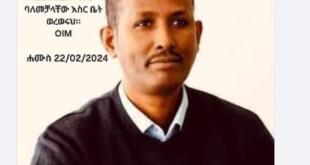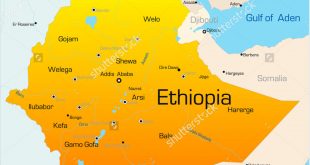http://www.satenaw.com
BefeQadu Z. Hailu
In an inaugural speech, Prime Minister Abiy Ahmed Ali turned almost all pessimists in to EPRDF enthusiasts. It is like he has all traits of a leader ‘naturally’. His charisma coupled with his fluency in three local languages of “the competing nationalities” made him look like the right person to fix the mess Ethiopian state is in. But, is he really the person to fix Ethiopia? Or, should we hope something else?
Overlaping Interests: Source of Support
It has been a bit long since OPDO officials pretend a dissenter within EPRDF. Their dissent was about their regional autonomy at first. This overlapped the interests of opposition groups and has gotten OPDOs unprecedented support from the protestors and general population. The overwhelming support OPDO received regionally encouraged them to have a deserved representation in the Federal Government. Besides, the regional autonomy was interfered by federal authorities who didn’t like to accept OPDO’s dissent.
Revolutionary Democracy, EPRDF’s ideology, is a practical application of twin principles: equality principle and democratic centralism. The former is about equal votes member parties of EPRDF have to make decisions regardless of differences in number of their respective constituencies; while the latter is about making all decisions centrally (top-down) contrary to genuine democratic principles of making decisions bottom-up. The new leadership of OPDO, under Lemma Megersa and Abiy Ahmed, has been seen divergent in this regard. Their divergence has been taken as rush to anarchy by some but welcomed by many others as progress to reform. OPDOs divergence has been witnessed when House of Peoples Representatives (HPR) passed the second State of Emergency. Contrary to the democratic centralism principles, most OPDO representatives voted against it. This was, with other multiple incidents, unusual gesture of change leading to overlapped interests to opposition groups from a member party of EPRDF.
Subdued Background: Cause of Suspicion
The establishment of OPDO is embarrassing. The founders were surrenders of TPLF during the armed insurgency before 1991. They were advised and organized as per the standards and principles of TPLF. EPRDF’s establishment was made convenient to TPLF’s targeted regime and its structure. The member parties, including OPDO, are now regional parties but their respective regions didn’t exist when they were established. TPLF manipulated a transitional government to restructure the country in a way it had already planned. In this way, the member parties were able to have regional governments to administer with supervision of TPLFites in the Central Committee (CC) of EPRDF. Even though there was equality principle in the CC, bosses (TPLFites) and their subordinates (OPDOs and others) could not have equal confidence to discuss matters objectively.
Therefore, the de jure decentralized system is a centralized one by de facto. And, the central power is controlled by TPLF, the dominant group in terms of actual power. This is why the major opposition’s resistance is against TPLF and its members, and why it is really difficult for many to comprehend the capability of subordinate member parties of EPRDF to stand equally to TPLF, the boss member.
The new generation of OPDO, however, has undermined the de facto hierarchical relationship of member parties. For them, TPLF old gurads are just folks whose political creativity has expired. Having this in mind, the new generation of OPDO tested and won TPLF old guards; they’ve snatched them most key positions, including Premiership and Foreign Affairs. But, they still remain dominated in the control of security apparatuses. This has left many suspicious that TPLF has not lost its minority dominance but wanted to hide behind and drive the country with an Oromo face. For these critics, EPRDF, its member parties and the wound their bad relationship to the people of Ethiopia can not be cured unless the Front dissolved.
End of Shame-History and The Last Surrendered OPDO Member
TPLFites never wanted Abiy to win the premiership. They wanted more obidient Shiferaw Shigute instead. However, in cooperation with ANDM, OPDO defeated TPLF’s significant interest probably for the first time in 27 years. This is a signal for the end of TPLF’s dominance over other EPRDF member parties. However, it will really end when the member parties demand ‘fair representation’ in the CC instead of the existing ‘equal representation’.
In the process to win the premiership, TPLF tried to use one of the old tools from OPDO, the House Speaker Abadulla Gemeda. Abadulla was one of surrendered by TPLF to later co-found OPDO. He resigned from his position in HPR and later withdraw his resignation. Rumor has it, he was promised currently Abiy’s position by TPLF, to make him continue submitting. Not anymore.
OPDO’s Success is also TPLF’s Success
On the surface, it seems TPLF has lost it. That’s also how TPLF old guards and its young cadres took the whole process. Yes, TPLF is on a free fall losing its dominance but this is also the best safe exit TPLF can get while containing what it had already built and accumulated. Previously, the fight was essentially between oppositions and TPLF/EPRDF. Had these oppositions won the fight, the most probable result would be dismantling the system TPLF built and criminalization of the whole group. OPDO’s dissent has reversed or, at least, slowed the other alternative. Now, the focus is on removing TPLF’s dominance within EPRDF and the Federal Government. The existance of the group and sustainability of the system is spared from jeopardy. Now, OPDO, the hand made of TPLF, is responsible to drive the wheel forward and a few years down the road, TPLF will be forgotten and the major target of oppositions will become the offspring, OPDO.
The Abiy Mania
Oromo nationalists have gotten an Oromo prime minister. That’s almost half their question answered, at least to many of them. Abiy knew it. He knew that the major challenge comes from non-Oromos, especially from those Ethiopianists whose view of Oromo nationalism as something not different from separatist movement. His inaugural speech is a clear appeal to the latter. He succeeded.
He then went to Somali region where he met the representatives of the regional state. Ethiopia’s Somali authorities were against him before his [s]election. By honoring them as his very first local destination as a Prime Minister, he convinced them he is a friend. Then, went to Ambo, center of protests that gave OPDO a chance to dominate the politics, and rewarded his generous words to the Qeerroo, the youth that is notourious in the protests. He called Qeerroo “is back bone of Ethiopia”.
He had introduction dinner with opposition leaders in a gesture that welcomed them for positive competition, which never happened before. Then continued his visit in to Mekelle, Tigrian capital, and home for TPLF. By speaking their langauage and remembering the historic role of Tigray in Ethiopia, he guaranteed the rare anti-Tigrian sentiment during past protests won’t be a risk in his administration. By doing so, he won the trust of many Tigrian nationalists with a single speech.
In only two weeks since he was sworn in, he has gained trust of overwhelmingly many citizens. Many congratulated each other on his coming and many hoped democratic change is coming with him. But, this mania on a single strong man is not without critiques. He was expected to lift the State of Emergency, which literally put the country under military administration, very soon. On the other hand, his populist speeches are being taken as a mere cult. Some, without being heard, are speaking about his deceiving character referring to his 12 minutes of interview that has heavily plagiarized content. However, the optimism and cult followed Abiy is something that took Meles more than a decade to build. His predecessor resigned without having a slight of it.
What Would Civil Rights Defenders Find from the Internal Battle?
It is when OPDO diverge from EPRDF’s principle, protests started to end with lesser casualities in Oromia; it is since OPDO’s new leadership took power that many jailed political prisoners are negotiated to be released. These are among the major interests shared by civil rights defenders with OPDO. As long as OPDO and its leader are showing reformist agenda, whether it is as a bargaining power within EPRDF or not, it will remain receiving support until Pandora’s box of EPRDF is opened.




